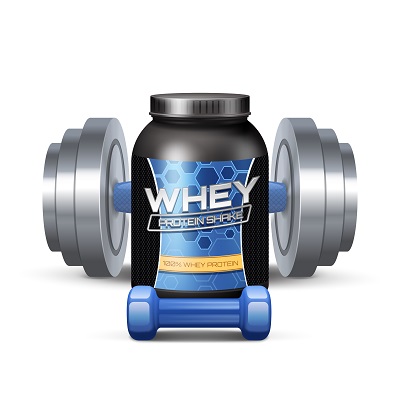 Protein powder is without a doubt the easiest way to get your daily protein and build muscle mass, but getting the right protein powder for your goals can be tricky.
Protein powder is without a doubt the easiest way to get your daily protein and build muscle mass, but getting the right protein powder for your goals can be tricky.
Many factors can affect which protein powder would be best for you. There are four main types of protein powder for you to choose from and many variations of each, so it can be easy to get confused.
Here is a quick guide to use when you are faced with an aisle of choices at your local supplement store.
Whey Protein
Pros:
1 – Whey protein is usually very affordable and accessible. Since it is the most popularly used protein in the market, companies are very competitive in price and quality.
2 – Whey protein is the closest to actually eating a juicy steak as it is derived from milk produced by cows. The range of muscle building amino acids in whey protein is greater than all other protein powder verities.
3 – The quality of protein that you get from whey is better for you and more easily and quickly absorbed into the body.
Cons:
1 – Some people are lactose intolerant and cannot handle whey protein since it is derived from milk.
2 – Vegetarians would not want to use whey protein, obviously.
3 – Whey protein doesn’t taste good and some companies can include many additives like refined sugar to try to add to the taste.
Who should use it?
Whey protein is best for the everyday person who is looking for a quick way to boost their protein intake, cut calories, lose fat, and increase energy. It’s best to consume as a meal replacement or post workout to help your muscles repair and grow.
Casein Protein
Pros:
1 – Casein protein is very similar to whey protein in its being derived from cow’s milk and its quality and content of protein amino acids.
2 – Casein can be added to whey protein for an even greater muscle mass gain and repair. Its anti-catabolic properties have proven to increase strength in the major muscle groups.
3 – Longer lasting casein protein can be absorbed throughout the day. It helps control cravings longer and can even be consumed right before bed for a slow and steady stream of muscle repairing protein while you sleep.
Cons:
1 – Casein protein is also not suitable for vegetarians or lactose intolerant people.
2 – It can be taken with other proteins but not at the same time! Casein protein is like tar in your stomach. It is very slowly digested. If you take it with whey, for example, you must take whey hours before casein in order to be able to absorb the whey protein.
3 – Similar to whey, casein protein powder can have additives, so make sure to check the labels well.
Who should use it?
Casein can be taken by lactose tolerant individuals who are looking to add to their protein intake. This is not the best option for post workout repair but great to add to whey supplementation at night. It is also a great option to use for marathoners or triathloners during competitions since the slow release of proteins will help with endurance during such long workouts.
Soy Protein
Pros:
1 – Soy is a viable source of vegetarian protein.
2 – Nutritive benefits of soy go beyond muscle growth. Organic compounds in the soy plant called isoflavones have been shown to be cancer fighting and very healthy for the cardiovascular system.
Cons:
1 – Those same isoflavones are considered detrimental in testosterone levels if consumed at a high level. This can be bad for men trying to gain muscle mass.
2 -Soy protein is not easily digested and cannot beat the quality of whey and casein protein and amino acids’ absorption in the body.
Who should use it?
Soy protein is a great alternative for those who are lactose intolerant, vegan, or vegetarians. Even though it may not hold its weight against milk derived protein, it is still a very viable source of protein for those looking to increase their muscle mass, especially women.
Vegetarian Options in Protein Powders
Every year new sources for protein powder are being used. Some such sources are pea protein powder, hemp protein powder and rice protein powder and blends of one or more.
Hemp Protein Powder
Hemp protein powder is derived from cannabis, otherwise known as marijuana. Although it contains very little of the ingredient that causes the high people get from smoking the plant, there is still some in there. It is considered beneficial due to its essential fatty acid content.
Again, this is plant based, safe for vegetarians, and easy to digest. It is a more expensive option, though since it is mostly imported.
Pea Protein Powder
Pea protein powder was found best for those who are having stomach aches or digestion problems with other protein powders but it lacks one essential amino acid called cysteine. Again, it is vegetarian so keep that in mind.
Rice Protein Powder
Rice protein powder is a source of protein but also a source of carbohydrates. Even though they are complex, if you are watching your carb intake beware of this one. It is also deficient in many of the amino acids contained in whey protein but still a viable source of protein.
Bottom Line
Blends are a good option for many people. You can pick and choose which benefits you want to mix!
There you have it! Hopefully, this helps you determine which protein powder is best for you. No matter which type you choose, always check the labels carefully. Higher prices don’t necessarily mean better product. You always want to choose products that use only natural ingredients.
Be wise, look closely, and happy shopping!






